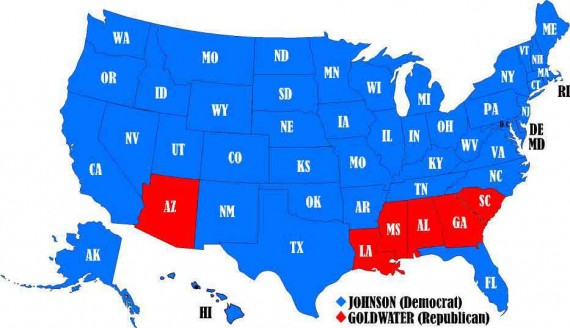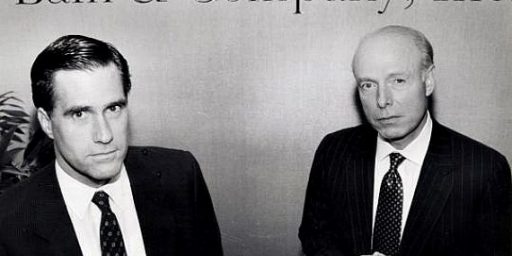Is 2012 1964 All Over Again?
The Republican debacle of 1964 offers some lessons for the current cycle.
While I have no idea why it’s in Foreign Affairs, Reihan Salam‘s “The Missing Middle in American Politics—How Moderate Republicans Became Extinct” (apparently a review of Geoffrey Kabaservice’s Rule and Ruin: The Downfall of Moderation and the Destruction of the Republican Party from Eisenhower to the Tea Party) is worth a read. Or at least the article summary is.
Salam uses the analogy that many of us have pointed to in discussing the trend: the 1964 election debacle, in which Barry Goldwatert was thrashed and “the once-mighty Republican Party was reduced to a regional rump. The Democrats won overwhelming majorities in the House and the Senate, which they used to pass Johnson’s Great Society legislation.”
The infighting the followed may look familiar:
To rebuild the party, a number of moderate Republican governors banded together to form the Republican Governors Association, designed to serve as a counterweight to the Republican National Committee, which had been captured by Goldwater conservatives. Shortly after the election, the association issued a statement, sponsored by Michigan Governor George Romney and other leading moderates, calling for a more inclusive GOP and criticizing Goldwater’s campaign. Stung by the failure of many moderates to actively support or even formally endorse his candidacy, Goldwater retorted that he needed no lessons in maintaining unity, having urged party members in 1960 to look past philosophical differences and pull together to support Richard Nixon’s presidential candidacy. Goldwater wrote a letter to Romney dripping with contempt: “Now let’s get to 1964 and ask ourselves who it was in the Party who said, in effect, if I can’t have it my way I’m not going to play? One of those men happens to be you.”
Romney wrote a lengthy reply to Goldwater, warning against European-style polarization. “Dogmatic ideological parties tend to splinter the political and social fabric of a nation,” Romney wrote. Worse, he added, political parties with fixed ideological programs “lead to governmental crises and deadlocks, and stymie the compromises so often necessary to preserve freedom and achieve progress.”
The GOP, and to a lesser extent the Democrats, have indeed became dogmatic ideological parties. And the results have been as Romney the Elder predicted.







Funny post.
Only 15 months ago the Democrats suffered one of the most comprehensive defeats in U.S. political history, but when a moderate Democrat, Heath Shuler, challenged a Moonbat liberal, Nancy Pelosi, for leadership of the Democrat House Caucus, the Democrats responded by …. retaining Pelosi as their leader. A sitting Democrat governor, Joe Manchin, won election to a U.S. Senate seat by running directly against the platform of the sitting Democrat president. Only six years after being the Democrat vice presidential nominee Joe Lieberman was ousted from the party caucus in a primary contest, in favor of a candidate too far to the left for a Connecticut general election. Meanwhile Republicans now hold a large majority of the state governorships and their largest majority in the U.S. House in four full generations.
Yet we’re discussing the death of the Republican moderate and the disintegration of the Republican Party.
Oddly enough we didn’t have those discussions after Nixon won 49 states, or when Reagan won 49 states, or when Bush Pere won 40 states.
Cognitive dissonance.
That all said, If by some cosmic infarction Santorum were to obtain the GOP nomination then, yes, of course, Obama easily will win reelection. The map won’t look too much like 1964’s map, however. Even Santorum would be able to carry more than 5 states. The map probably will look a lot like 1996’s electoral tally. Oddly enough the GOP somehow managed after that fiasco not to go the way of the Dodo, despite the best wishes to the contrary on the part of the media/academe cabal.
@Tsar Nicholas II:
Don’t confuse House elections with national elections. Gerrymandering actually makes polarization a benefit in those contests. And I argued even then that choosing Tea Party crazies like Sharon Angle, Christine O’Donnell, and others cost the GOP the Senate.
Not only did we have those discussions but the Democrats did just what the GOP did in 1964: formed a moderate group (the Democratic Leadership Conference) and worked to change the perceptions of the party. DNC star Bill Clinton ran in 1992 as a New Democrat, beating GWB. And the Democrats took California for the first time in eons that year and have won it every presidential cycle since.
@Tsar Nicholas II:
No, because that was the almost 20 year period that the Democratic Party was in the wilderness, trying to find its way back. Which it didn’t do – electorally – until the DLC (the Democratic analog to the RGA mentioned in the article) managed to get enough clout to push Clinton/Gore in 1992. And even then, one might argue that that ticket was prematurely successful due to the presence of Perot.
James’s point isn’t an obscure one – the current GOP contains the bulk of the right-wing while the current Democrats run the gamut from center-right to far-left.
As for this:
Ignoring the “moonbat” qualifier, Shuler’s bid was quixotic at best. It wasn’t the Progressive Caucus that lost in the House in 2010, it was the Blue Dogs, who were more than decimated. Separate from political philosophy, if your caucus consists of 60% Faction A and 30% Faction B *before* an election, and 75% Faction A and 10% Faction B *after* an election, in what non-parliamentary world does a member of Faction B become caucus leader?
When it comes to Shuler, were the Democrats going to have as their leader a guy who voted against their signature piece of legistlature legislature(ACA)?
The 1964/2012 analogy makes the mistake of viewing ideological rigidity as all-important, as opposed to simply important. Given that Goldwater was running against a popular incumbent at a time when the nation was still mourning the loss of JFK, it’s unlikely even a Nelson Rockefeller could have defeated LBJ that year. Concluding that LBJ won because his opponent was Goldwater commits essentially the same fallacy as when conservatives point to Reagan’s 1980 victory as proof that nominating a “true conservative” is always a plus for the GOP. If the incumbent party is strong enough, any challenger will have trouble beating its nominee, and if the party is weak enough, just about anyone can beat him. Other things being equal, a moderate Republican will be more electorally viable than a solidly right-wing one. But other things are not equal, as McCain’s erratic 2008 campaign attested.
The GOP do have a “Goldwater problem” of sorts (a delusional base that thinks nominating extremists is the key to electoral victory), but it doesn’t mean that on this particular year they’re headed for a 1964-level rout. The conditions just aren’t right. Even if the economy picks up and the Republicans nominate Newt Gingrich, I doubt the GOP’s (virtually inevitable) defeat will be anywhere near 1964 levels. And if the economy doesn’t pick up, it could be 1980 all over again–except the “Reagan” this time would be a genuinely unstable loon.
Speaking as one of the few people here who actually remember 1964 (it was the first election I voted in) any Republican was going to face disaster that year. Johnson was unassailable which in a way was how Goldwater got the nomination because the middle of the party didn’t care too much and thought that if Goldwater failed miserably it would teach the crazies a lesson but they didn’t quite anticipate the scale of the defeat and its effect down ticket. It’s long term effects weren’t as traumatic as is being suggested because the Democratic party committed suicide over Vietnam. Given the fact that all the conservatives are now concentrated in the Republican party (there were still quite a lot in the Democratic party in 1964) I don’t think it’s facing Armageddon if for example Santorum were the candidate. He’d probably lose slightly worse than Romney as best we can tell at the moment but I’m not sure that in the midwest having once talked about Satan is that much more of a handicap than having advocated the death of the auto industry. If you look at the polls (for what they are worth at this stage) both Romney and Santorum are in the low to mid 40’s against Obama. Whether he wins or not is going to depend on turnout by his 2008 coalition which I think will happen….were already seeing poll reflect increased energisation and as this gets down to the short strokes this can only increase.
This is pure hyperbole. The most comprehensive defeat. I don’t think the martyr of Ekaterinburg understands the meaning of the word comprehensive. They won about 40 odd house seats during a major recession in an off year election when the turnout was 80 million versus 132 million in 2008. If the 2008 turnout is repeated it’s quite possible the Dems could win the house back.
The 1964 retrospective brings to mind a few comparisons:
1. The continuing conflation of moderate temperament and moderate policies. Goldwater’s general election problem was his immoderate way of speaking that the opposition was able to characterize as immoderate policies. The country would later elect a Goldwater Republican to two terms, but was a great communicator. Unless Gingrich wins the nomination, I don’t see that problem for the Republicans.
2. The continuing conflation of policy and personality. I believe Goldwater is referencing the fact that after he won, Rockefeller and Romney refused to support him. They may in turn have been as much about politics as how Rockefeller was supposed to win the party’s nomination and he was drug down by personal scandals. One does sense simmering personality clashes in the Republican primaries, which if allowed to fester will hurt the nominee, regardless of which wing of the party they emerge from.
@PD Shaw:
Were you there in 1964? Whatever Reagan called himself he wasn’t remotely like the Goldwater of 1964 who in craziness profile terms looked more like Ron Paul.
I’ve never particularly liked the “common history” version of the 1964 election, that is the Republicans lost only because they chose an extremist fringe candidate in Goldwater. Goldwater was not by any stretch a religious conservative, and I don’t think he was all that extreme. He certainly wasn’t an unserious vanity candidate like the various demagouges we see in the current race.
Goldwater lost because the election occured less than a year after the assassination of an extremely popular president and the Democrat candidate was seen as the heir to a fallen leader. Unless you can point to some other Republican candidate who could have overcome, it’s hard to argue that this should be seen as a lesson about the Republican platform rather that an expression of grief by a country that didn’t want to have a third president in 11 months.
If the failure was Goldwater’s platform, how was Reagan able to win handly on a nearly identicle platform?
@Stormy Dragon:
1. Personality/likeability
2. Any Republican nominee would have had a much harder time against 1964 Johnson versus 1980 Carter.
2. Reagan had over a decade to develop and hone his message, and to introduce his ideas to the public. Thus they were perceived as less radical and more normative in 1980 than when Goldwater presented them in 1964.
@Stormy Dragon:
Nope he wasn’t extreme, he was just opposed to any civil rights legislation and openly talking about the need for nuclear war with Russia. He was certain to lose against Johnson but the size of his loss was entirely due to the fact he was widely considered a nut case. My father who had never voted Democrat in his life voted against him. Distance and some retrospective smokescreens have obscured the fact he was widely considered off his rocker at the time.
@Stormy Dragon:
http://www.youtube.com/watch?v=ExjDzDsgbww
Trust me everyone knew who was being talked about.
I don’t recall it that way at all. Lamont was not a superlefty. He was a pretty wealthy business guy from Greenwich.
He just happened to be against the Iraq War, and a lot of people latched onto him for that reason. Myself included. Lieberman’s sin was the war. Not only going along with the war, but being an outspoken proponent/supporter of it, long past the point where it made any sort of sense.
Your Lieberman narrative only holds if you consider being angry about stupid wars that shouldn’t have been fought to be “moonbat leftism.”
@Rob in CT:
The usual slanted nonsense from the martyr of Ekaterinburg. Lieberman only won because the Republicans effectively abandoned their own candidate and threw their support behind Lieberman over the war in Iraq. He also retained a lot of residual loyalty amongst democrats so this combination got him home. It’s exactly because the same thing isn’t going to happen again that Lieberman has chosen to retire. Lamont wasn’t a lefty by any stretch he runs a PE firm in Greenwich.
I was just slightly too young to cast my first vote for Mr Goldwater; I was one of those obnoxious kids who carried a well-worn copy of “Conscience of a Conservative” with me everywhere I went. All that my friend Joe (and some others) says about the BaAuH2O campaign is as I recall it; he went to Tennessee and advocated selling TVA, for god’s sake. He opposed the Civil Rights Act while the memory of burning ‘Freedom Rider’ buses and the murder of Chaney, Swerner and Goodman was fresh. LBJ was still wrapped in the mantle of the assassinated JFK.
In some ways the movement to nominate Goldwater is like the so-called-conservative movement today. Back then the activists were referred to as “little old ladies in tennis shoes” and they imagined they were taking the Republican party away from “the elites” like Nelson Rockefeller. A very similar ethos. (Completely unrelated, did you know that Hillary was a ‘Goldwater Girl’? Lots of present day lefties first experienced politics thru the Goldwater lens.)
But after the election which we remember as a complete Republican disaster, those right-wingers didn’t see it that way. I remember reading in National Review (I subscribed in those days) that there were two wonderful things that had happened in the election. First, the right-wing had taken over the Republican party. And, second, they had found 27 million Americans agreed with them on their issues.
As the wing-nuts tell the story, Barry Goldwater was a John-the-Baptist who was sacrificed in order that the Messiah could win in ’80.
They have a point.
@JohnMcC: I wasn’t quite born when the 1964 elections were held. What’s amusing is that, in his dotage, Goldwater became something of a pariah in Republican circles for being too far left on the social issues!
Writing responses to Tsar Nicholas II must have been like shooting fish in a barrel for James, Gromitt Gunn, Brummagem Joe, and Rob in CT…
Perhaps 1980 would have been quite different if Carter had reached a positive resolution to the Iranian hostage crisis before the election, especially if that had happened on the eve of the election…
Hey, no extremism there, eh?
When even someone like Barry Goldwater would be considered a RINO in today’s GOP, that tells you all you need to know…
Comparing election that are most than a decade part is foolish. The voting public in 1964 was well over 80% white. The voting public today is less than 65% white. Today, less than half of the children in elementary school are white.
What the Republicans are really showing is that when there is no way for a political party to survive due to demographic changes in the U.S., then only idiots will be interested in being the standard bearer for that same party.
I wonder what year will be the first year when no one entering the Ivy League or Ivy like universiites will identiy as a Republican. My guess is that it will be less than 10 years.
@superdestroyer: Ideas can survive demographic changes. All you have to do is communicate them effectively, and walk the walk.
It also helps if your ideas aren’t primarily concerned about how great white people are.
@Tillman:
That assumes that the culture of those demographic groups are open to the ideas at all. IN reality, black, Hispanic, Asian, Jewish, homosexual cultures are very far away from any interest in conservative ideas.
The U.S. is faced with an political rules set up to make changes through election at the same time that elections are becoming irrelevant.
Wonks in the future will be discussing powerbrokers and clouts instead of elections.